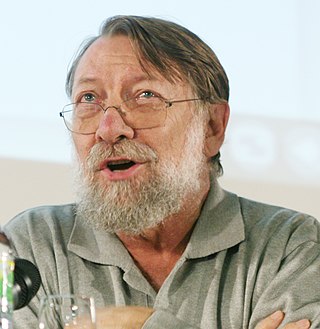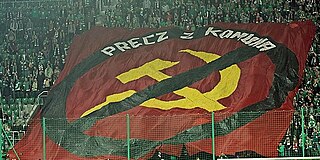The Victims of Communism Memorial is a memorial in Washington, D.C., United States. It may also refer to:

A communist state, also known as a Marxist–Leninist state, is a one-party state that is administered and governed by a communist party guided by Marxism–Leninism. Marxism–Leninism was the state ideology of the Soviet Union, the Comintern after Bolshevisation and the communist states within the Comecon, the Eastern Bloc, and the Warsaw Pact. Marxism–Leninism currently still remains the ideology of a few parties around the world. After its peak when many communist states were established, the Revolutions of 1989 brought down most of the communist states, however, it is still the official ideology of the ruling parties of China, Cuba, Laos, Vietnam, and to a lesser extent, North Korea. During most of the 20th century, before the Revolutions of 1989, around one-third of the world's population lived under communist states.

The Black Book of Communism: Crimes, Terror, Repression is a 1997 book by Stéphane Courtois, Andrzej Paczkowski, Nicolas Werth, Jean-Louis Margolin, and several other European academics documenting a history of political repression by communist states, including genocides, extrajudicial executions, deportations, and deaths in labor camps and artificially created famines. The book was originally published in France as Le Livre noir du communisme: Crimes, terreur, répression by Éditions Robert Laffont. In the United States, it was published by Harvard University Press, with a foreword by Martin Malia. The German edition, published by Piper Verlag, includes a chapter written by Joachim Gauck. The introduction was written by Courtois. Historian François Furet was originally slated to write the introduction, but he died before being able to do so.

Richard Edgar Pipes was an American academic, who specialized in Russian and Soviet history, and wrote many books on these topics, including Russia under the Old Regime (1974), The Russian Revolution (1990), and Russia Under the Bolshevik Regime (1994). Pipes was a frequent interviewee in the press on the matters of Soviet history and foreign affairs. His writings also appear in Commentary, The New York Times, and The Times Literary Supplement. At Harvard, he taught large courses on Imperial Russia as well as the Russian Revolution and guided over 80 graduate students to their PhDs. In 1976, he headed Team B, a team of analysts organized by the Central Intelligence Agency (CIA) who analyzed the strategic capacities and goals of the Soviet military and political leadership. Pipes is the father of American historian Daniel Pipes.

Stéphane Courtois is a French historian and university professor, a director of research at the French National Centre for Scientific Research (CNRS), professor at the Catholic Institute of Higher Studies (ICES) in La Roche-sur-Yon, and director of a collection specialized in the history of communist movements and communist states.

Anti-Sovietism, anti-Soviet sentiment, called by Soviet authorities antisovetchina, refers to persons and activities actually or allegedly aimed against the Soviet Union or government power within the Soviet Union.

The Victims of Communism Memorial is a memorial in Washington, D.C. located at the intersection of Massachusetts and New Jersey Avenues and G Street, NW, two blocks from Union Station and within view of the U.S. Capitol. The memorial is dedicated "to the more than one hundred million victims of communism". The Victims of Communism Memorial Foundation says the purpose of the memorial is to ensure "that the history of communist tyranny will be taught to future generations." The Memorial was opened by President George W. Bush on June 12, 2007. It was dedicated on the 20th anniversary of President Ronald Reagan's "tear down this wall" speech in front of the Berlin Wall.
The actions by governments of communist states have been subject to criticism across the political spectrum. Communist party rule has been especially criticized by anti-communists and right-wing critics, but also by other socialists such as anarchists, communists, democratic socialists, libertarian socialists and Marxists. Ruling communist parties have also been challenged by domestic dissent. According to the critics, rule by communist parties has often led to totalitarianism, political repression, restrictions of human rights, poor economic performance, and cultural and artistic censorship.
Holocaust trivialization is any comparison or analogy that diminishes the impact of the Holocaust, the Nazi genocide of six million European Jews during World War II. The Wiesel Commission defined trivialization as the abusive use of comparisons with the aim of minimizing the Holocaust and banalizing its atrocities. Originally, holocaust meant a type of sacrifice that is completely burnt to ashes; starting from the late 19th century, it started to denote an extensive destruction of a group, usually people or animals. The 1915 Armenian genocide was described as a "holocaust" by contemporary observers.
Lev Eugene Dobriansky was an American diplomat and professor of economics at Georgetown University. He served as U.S. Ambassador to the Bahamas, and was also an anti-communist advocate. He is known for his work with the National Captive Nations Committee and the Victims of Communism Memorial Foundation, and formerly served as the chairman emeritus of the latter.

Anti-communism is political and ideological opposition to communist beliefs, groups, and individuals. Organized anti-communism developed after the 1917 October Revolution in the Russian Empire, and it reached global dimensions during the Cold War, when the United States and the Soviet Union engaged in an intense rivalry. Anti-communism has been an element of many movements and different political positions across the political spectrum, including anarchism, centrism, conservatism, fascism, liberalism, nationalism, social democracy, socialism, leftism, and libertarianism, as well as broad movements resisting communist governance. Anti-communism has also been expressed in philosophy, by several religious groups, and in literature. Some well-known proponents of anti-communism are former communists.

The Taras Shevchenko Memorial is a bronze statue and stone relief-adorned wall located on the 2200 block of P Street NW in the Dupont Circle neighborhood of Washington, D.C., United States. It is one of many monuments in Washington, D.C. that honor foreign heroes who symbolize freedom in their native countries. Sculpted by Leo Mol, the memorial honors Taras Shevchenko (1814–1861), a Ukrainian poet and artist who influenced the development of modern Ukrainian literature.

Mass killings under communist regimes occurred through a variety of means during the 20th century, including executions, famine, deaths through forced labour, deportation, starvation, and imprisonment. Some of these events have been classified as genocides or crimes against humanity. Other terms have been used to describe these events, including classicide, democide, red holocaust, and politicide. The mass killings have been studied by authors and academics and several of them have postulated the potential causes of these killings along with the factors which were associated with them. Some authors have tabulated a total death toll, consisting of all of the excess deaths which cumulatively occurred under the rule of communist states, but these death toll estimates have been criticized. Most frequently, the states and events which are studied and included in death toll estimates are the Holodomor and the Great Purge in the Soviet Union, the Great Chinese Famine and the Cultural Revolution in the People's Republic of China, and the Cambodian genocide in Democratic Kampuchea.
The Victims of Communism Memorial Foundation (VOC) is a non-profit anti-communist organization in the United States, authorized by a unanimous Act of Congress in 1993 for the purpose of "educating Americans about the ideology, history and legacy of communism."

The Black Ribbon Day, officially known in the European Union as the European Day of Remembrance for Victims of Stalinism and Nazism and also referred to as the Europe-wide Day of Remembrance for the victims of all totalitarian and authoritarian regimes, is an international day of remembrance for victims of totalitarianism regimes, specifically Stalinist, communist, Nazi and fascist regimes. Formally recognised by the European Union, the Organization for Security and Co-operation in Europe and some other countries, it is observed on 23 August. It symbolises the rejection of "extremism, intolerance and oppression" according to the European Union. The purpose of the Day of Remembrance is to preserve the memory of the victims of mass deportations and exterminations, while promoting democratic values to reinforce peace and stability in Europe. It is one of the two official remembrance days or observances of the European Union, alongside Europe Day. Under the name Black Ribbon Day it is an official remembrance day of Canada. The European Union has used both names alongside each other.

The Prague Declaration on European Conscience and Communism was a declaration which was initiated by the Czech government and signed on 3 June 2008 by prominent European politicians, former political prisoners and historians, among them former Czech President Václav Havel and future German President Joachim Gauck, calling for "Europe-wide condemnation of, and education about, the crimes of communism." Much of the content of the declaration reproduced demands formulated by the European People's Party in 2004, and draws heavily on the theory or conception of totalitarianism.
The Declaration on Crimes of Communism is a declaration signed on 25 February 2010 by several prominent European politicians, former political prisoners, human rights advocates and historians, which calls for the condemnation of communism.
The Platform of European Memory and Conscience is an educational project of the European Union bringing together government institutions and NGOs from EU countries active in research, documentation, awareness raising and education about the crimes of totalitarian regimes. Its membership includes 68 government agencies and NGOs from 15 EU member states and 8 non-EU countries including Ukraine, Albania, Georgia, Iceland, Moldova, the United Kingdom, the United States and Canada. Its members include the Institute of National Remembrance, the Berlin-Hohenschönhausen Memorial, the Stasi Records Agency and the Victims of Communism Memorial Foundation. The platform has offices in Prague and Brussels (formerly). The President of the platform is Łukasz Kamiński, former President of the Polish Institute of National Remembrance.
The Estonian Institute of Historical Memory is a non-governmental foundation that focuses on the investigation of war crimes and human rights violations committed by totalitarian regimes and research of totalitarian ideologies that created such regimes. The Institute aims to give the general public a comprehensive, objective and international overview of human rights violations and crimes committed by totalitarian regimes both in Estonia and abroad.
The Memorial to the Victims of Communism – Canada, a Land of Refuge is a controversial monument that as of July 2021 is currently under construction in Ottawa, Ontario, Canada. It was originally to be erected on a site between the Supreme Court of Canada and the National Library of Canada but in December 2015, Canadian Heritage Minister Mélanie Joly suggested that the National Capital Commission instead approve a 500 square metre site half a kilometre to the west, in the Garden of the Provinces and Territories. Under the revised timeline, a national competition was held in 2016 and 2017 to select a new design for the monument. The site was dedicated in a ceremony held on November 2, 2017. Construction began in early November 2019, and was expected to be completed by the summer of 2020, but by the end of 2022 was still not finished, with no construction progress made in 2022.

The FRIENDSHIP Act of 1993 was enacted as a law of the United States enhancing prior statutory provisions which govern international relations between the former Republics of the Soviet Union and United States during the Cold War. The Act of Congress reformed United States statutes related to: